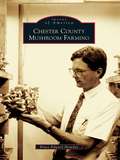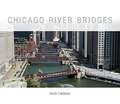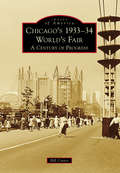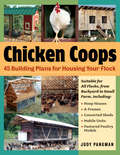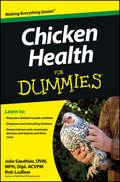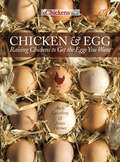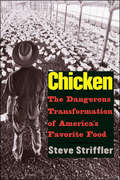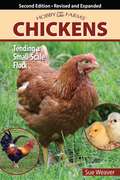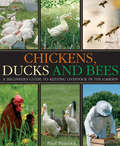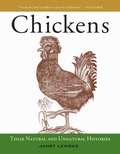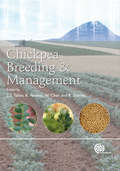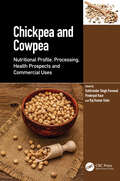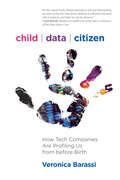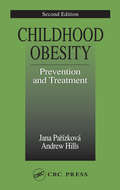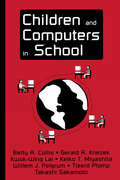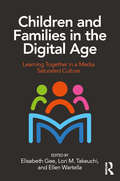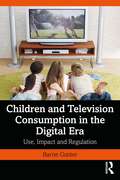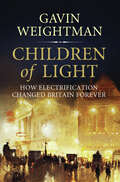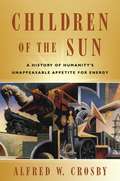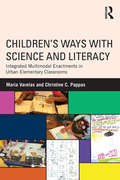- Table View
- List View
Chester County Mushroom Farming
by Bruce Edward MowdayChester County is well known for its sprawling scenic views, rich farmland, the Main Line, and mushrooms. Chester County, and specifically the village of Kennett Square, is known as the mushroom capital of the world because of the quantity and quality of mushrooms grown there. Mushrooms have been around for centuries, with the French beginning cultivation in the 1600s, and mushroom farming began in Chester County more than 120 years ago. The earliest farmers were Quakers, but over the years members of the Irish, Italian, and Hispanic communities have joined the ranks of Chester County mushroom farmers. The local mushroom farmers were responsible for the forming of the American Mushroom Institute more than a half century ago.
Chicago River Bridges
by Patrick T. McbriartyChicago River Bridgespresents the untold history and development of Chicago's iconic bridges, from the first wood footbridge built by a tavern owner in 1832 to the fantastic marvels of steel, concrete, and machinery of today. It is the story of Chicago as seen through its bridges, for it has been the bridges that proved critical in connecting and reconnecting the people, industry, and neighborhoods of a city that is constantly remaking itself. In this book, author Patrick T. McBriarty shows how generations of Chicagoans built (and rebuilt) the thriving city trisected by the Chicago River and linked by its many crossings. This comprehensive guidebook chronicles more than 175 bridges spanning 55 locations along the Main Channel, South Branch, and North Branch of the Chicago River. With new full-color photography of existing bridges and more than one hundred black and white images of bridges past, the book unearths the rich history of Chicago's downtown bridges from the Michigan Avenue Bridge to the often forgotten bridges that once connected thoroughfares such as Rush, Erie, Taylor, and Polk Streets. Throughout, McBriarty delivers new research into the bridges' architectural designs, engineering innovations, and their impact on Chicagoans' daily lives, explaining how the dominance of the "Chicago-style" bascule drawbridge influenced the style and mechanics of bridges worldwide. Interspersed throughout are the human dramas that played out on and around the bridges, such as the floods of 1849 and 1992, the cattle crossing collapse of the Rush Street Bridge, or Vincent "The Schemer" Drucci's Michigan Avenue Bridge jump. A confluence of Chicago history, urban design, and engineering lore, Chicago River Bridges illustrates Chicago's significant contribution to drawbridge innovation and the city's emergence as the drawbridge capital of the world.
Chicago's 1933-34 World's Fair: A Century of Progress
by Bill CotterIt took six years and cost $100 million, but on May 27, 1933, the gates swung open on the biggest birthday party the city of Chicago had ever seen. The Century of Progress Exposition, better known as the 1933-34 Chicago World's Fair, commemorated the amazing progress that had been made since the founding of the city just 100 years earlier. Many of America's largest companies joined with countries from around the world to showcase their histories and advertise their newest products. The road to opening day was not an easy one, with the Great Depression making it look like the fair might never be built, but thousands of small investors stepped forward to help close the financial gap. The fair went on to an unprecedented second season, and when the gates finally closed after the last of the 39 million visitors went home, it had achieved something quite rare among world's fairs: earning a profit. This collection of rare photographs, previously unpublished, highlights the major attractions of the fair and the astonishing changes made between seasons.
Chicas en Tecnología®: Reiniciando el sistema
by Mariana Varela Carolina Hadad Sofía ContrerasLa tecnología tiene un papel determinante en lo cotidiano: el trabajo, la educación y la vida social. Pero es un área desigual para las mujeres. Este libro da cuenta de la brecha de género en tecnología y de la invisibilización de las pioneras y las líderes, pero es también una invitación a reiniciar el sistema, a que las mujeres consideren a la tecnología como una aliada para mejorar el mundo. La tecnología tiene un papel determinante en lo cotidiano: el trabajo, la educación y la vida social. Pero es un área profundamente desigual para las mujeres. La disparidad comienza en la infancia -a las niñas les regalan una cocinita y a los niños, videojuegos- y continúa durante la escolarización, la formación profesional, la capacitación, en el ambiente laboral o cuando deciden emprender. Las mujeres chocan constantemente con la estigmatización, la mirada estereotipada, la brecha salarial, discriminación y violencia. Cuando en 2015 Sofía Contreras, Carolina Hadad, Melina Masnatta y Mariana Varela crearon la organización Chicas en Tecnología® con el objetivo de achicar la brecha de género en ese campo, el feminismo no tenía la fuerza de hoy en la escena pública, y si bien se ganaron derechos, aún falta mucho. Con datos, fuentes, investigaciones, análisis y la experiencia de las autoras, este libro evidencia las barreras que las mujeres enfrentan en el ambiente tecnológico, pero además propone cambios e ideas en educación, liderazgo, emprendedorismo, mentoreo. Rescata de la invisibilización a las pioneras y demuestra por qué es fundamental que haya cada vez más líderes mujeres y multiplicidad de voces. Chicas en Tecnología® es una invitación a reiniciar el sistema, a que las mujeres consideren a la tecnología como una aliada para mejorar el mundo.
Chick Days: An Absolute Beginner's Guide to Raising Chickens from Hatching to Laying
by Jenna Woginrich Mars VilaubiJenna Woginrich chronicles the life journey of three chickens (Amelia, Honey, and Tilda) from fluffy, newly hatched bundles to grown hens laying eggs of their own. As you watch these chickens grow, you’ll learn everything you need to know about chicken behavior, feeding, housing, and health care. This playfully informative guide will inspire you to confidently raise your own feathered flock.
Chicken Coops: 45 Building Ideas for Housing Your Flock
by Judy PangmanJust like houses, chicken coops come in all shapes and sizes. Judy Pangman presents how-to drawings and conceptual plans for 45 coops — from the strictly practical to flights of fancy — guaranteed to meet the needs of every bird owner, however big or small your flock may be. Color photographs and innovative suggestions fill this encouraging guide, while lively anecdotes profile an array of coop builders and their various construction methods. Start building the coop of your chickens’ dreams!
Chicken Health For Dummies
by Ludlow Julie GauthierEverything you need to care for and keep happy, healthy chickensWith directives on diagnosing and treating sick or ailing chickens, as well as general information on how to keep chickens in peak condition, Chicken Health For Dummies is your go-to guide on how to best care for and keep chickens.Inside, you'll get everything you need to know about chicken health and wellness: an encyclopedia full of common and not-so-common diseases, injuries, symptoms, and cures that chicken owners may encounter. Chicken Health For Dummies provides chicken owners with one handy, all-encompassing resource. Helps you identify potential hazards and signs of ill health in your chickenShows you how to properly examine chickens to identify and isolate potential health issues before they spread to the rest of the flockAn encyclopedia full of common and uncommon diseases, injuries, symptoms, and cures for chickensChicken Health For Dummies joins Raising Chickens For Dummies and Building Chickens Coops For Dummies to round out the For Dummies reference library as a must-have resource for both rural and urban chicken owners.
Chicken and Egg
by Kate Osborne James Hermes Andy CawthrayThe age-old question of which comes first is finally answered in Chicken and Egg! For the purposes of egg-centric chicken keepers, it's the egg! A new approach to chicken keeping, Chicken and Egg is specifically geared toward hobby farmers and casual chicken keepers who wish to produce eggs of a particular color, flavor, and type. Whether the reader desires the delectable turquoise eggs of the Araucana or the chocolate brown eggs of the Blue Copper Maran, learn how it's possible to put the egg before the chicken. Written by two expert poultry breeders and specialists, Andy Cawthray and James Hermes, this new colorful handbook offers an edifying overview of the natural history of chickens and the science of egg production so that keepers better understand how to care for egg-layers, improve the quality of their eggs through diet and housing, and maximize their egg production for years to come. The authors have rounded up a few dozen chicken breeds and offer their hardboiled advice about which hens offer the most egg-cellect daily output.-Directory of the best egg-laying chicken breeds, plus colorful two-page spreads of the 20 most popular choices-Advice on how to select and set up your flock, including safe and affordable housing, runs, and coops-Selecting the best diets for your flock to maximize production and avoid egg failure-Essential information about brooding and laying, the birds' behavior, and solving problems within the flock-Specially commissioned artwork from watercolorist and illustrator Kate Osborne
Chicken: The Dangerous Transformation of America's Favorite Food
by Steve StrifflerAnthropologist Steve Striffler begins this book in a poultry processing plant, drawing on his own experiences there as a worker. He also reports on the way chickens are raised today and how they are consumed. What he discovers about America's favorite meat is not just unpleasant but a powerful indictment of our industrial food system. The process of bringing chicken to our dinner tables is unhealthy for all concerned, from farmer to factory worker to consumer. The book traces the development of the poultry industry since the Second World War, analyzing the impact of such changes as the destruction of the family farm, the processing of chicken into nuggets and patties, and the changing makeup of the industrial labor force. The author describes the lives of immigrant workers and their reception in the small towns where they live. The conclusion is clear: there has to be a better way. Striffler proposes radical but practical change, a plan that promises more humane treatment of chickens, better food for the consumer, and fair payment for food workers and farmers.
Chickens
by Sue WeaverHobby Farms Chickens: Tending a Small-Scale Flock for Pleasure and Profit is geared toward the hobby farmer looking to begin his or her own flock of chickens on a small farm or even backyard. Author Sue Weaver, who keeps various exotic breeds and countless barnies on her farm, is an expert on all things livestock and an avowed chicken fanatic. This photo-filled guide begins with "Chickens 101" and details the physiology of chickens, members of the Phasianidea family, providing beginning hobby farmers with a basic education in the chicken's unique physical makeup (from wings and feathers to beaks and digestive tracts), behavior, mating, and its unexpected high intelligence. The author offers advice on choosing the right types of chickens to get started: meat, egg, or dual purpose, or maybe even "just for pets." The book is an excellent resource for selecting which breed of chicken is best for the hobby farmer, based on the birds' traits, such as aggression, personality, noise factor, tolerance for heat, confinement, cold, etc. Chickens also provides information on selecting or building a suitable chicken coop for the hobby farmer's brood, outlining the basic requirements (lighting, ventilation, flooring, waterers, insulation, safety, and so forth). A detailed chapter on feeding chickens offers essential guidance on nutrition, commercial feeds, supplements, and water requirements. For the chicken hobby farmer looking to start with a clutch of baby chicks (from his own hen or an outside source), the author provides excellent info on incubators and hatching as well as all of the accommodations and preparation required for hens in the nest box. A chapter on selling eggs and broilers provides timetables, requirements, and dos and don'ts to get a hobby farmer's business off on the right foot. All chicken keepers will find the chapter on health of particular value, with expert advice on preventing common problems and dealing various maladies and diseases. Much detailed information about all of the topics in the book is encapsulated in sidebars. A glossary of over 125 terms plus a detailed resource section of chicken and poultry associations, books, and websites complete the volume. Fully indexed.
Chickens, Ducks and Bees: A Beginner's Guide To Keeping Livestock In The Garden
by Paul PeacockGrowing your own vegetables often leads gardeners to want to go one step further and keep some livestock. Chickens, ducks and bees are the most likely candidates for the first time livestock owner - especially if you live in a town or have only a small amount of land. They can all be kept happily together. Keeping these animals is a fun and absorbing hobby and is a great antidote to stress. There is nothing more rewarding than the collection of your own fresh eggs and honey. The book is full of sound, practical advice and looks at exactly what you need to get started: the equipment, housing, space and feed. Taking the breeds best suited for the smaller garden, town garden, or allotment, the responsible care and management of these animals is thoroughly covered in a friendly, approachable style with their welfare always in mind. Chickens: from breed selection to housing, feeding, care, and health issues this book provides simple, no nonsense information about how hens live, their needs and lifestyle and how to keep happy, healthy and productive hens. Ducks: here is all you need to know to introduce these entertaining animals to the garden - their walking requirements, their feed, and the surprisingly small amount of water they need. Duck eggs are great for baking and this book shows you how to keep your ducks happy and laying. Bees: there are many more people now interested in keeping bees. Paul Peacock shows you how to get started, where to get help, what equipment you need, and how to handle bees and harvest their honey. It emphasises gentle bees, and covers the control of varroa and other potential bee diseases.
Chickens, Ducks and Bees: A beginner's guide to keeping livestock in the garden
by Paul PeacockGrowing your own vegetables often leads gardeners to want to go one step further and keep some livestock. Chickens, ducks and bees are the most likely candidates for the first time livestock owner - especially if you live in a town or have only a small amount of land. They can all be kept happily together. Keeping these animals is a fun and absorbing hobby and is a great antidote to stress. There is nothing more rewarding than the collection of your own fresh eggs and honey. The book is full of sound, practical advice and looks at exactly what you need to get started: the equipment, housing, space and feed. Taking the breeds best suited for the smaller garden, town garden, or allotment, the responsible care and management of these animals is thoroughly covered in a friendly, approachable style with their welfare always in mind. Chickens: from breed selection to housing, feeding, care, and health issues this book provides simple, no nonsense information about how hens live, their needs and lifestyle and how to keep happy, healthy and productive hens. Ducks: here is all you need to know to introduce these entertaining animals to the garden - their walking requirements, their feed, and the surprisingly small amount of water they need. Duck eggs are great for baking and this book shows you how to keep your ducks happy and laying. Bees: there are many more people now interested in keeping bees. Paul Peacock shows you how to get started, where to get help, what equipment you need, and how to handle bees and harvest their honey. It emphasises gentle bees, and covers the control of varroa and other potential bee diseases.
Chickens: Their Natural and Unnatural Histories
by Janet LembkeFramed by the author’s personal experience with backyard hens, Chickens: Their Natural and Unnatural Histories explores the history of the chicken from its descent from the dinosaurs to the space-age present. En route, Lembke surveys chickens in ancient Greece, the Middle Ages, the Renaissance, the nineteenth century, and modern times, including the role of chickens in Jewish and Muslim practices. She also investigates the birds’ contributions to science and their jaunty appearances in literature. Eggs receive a chapter of their own, as does chicken cuisine, comprising recipes from the Roman Empire to today’s favorites. Stories about chickens appear, too, often written by those who keep them, including the painter Grandma Moses, the man who holds Cleveland’s Farm Animal Permit No. 17, and Brenda, who had to give her young roosters a talking-to for behaving like sheep. Chickens have only recently come to a sorry pass in the Western world, where broilers and laying hens are factory-farmed. Lembke investigates the fate of such birds and explores the sustainable, humane alternatives to raising birds for meat and eggs. A celebration of the chicken in its every aspect, Chickens is sure to delight the chicken fancier, the backyard chicken keeper, and everyone concerned about where our food comes from and how we can treat animals more compassionately.
Chickpea Breeding and Management
by B. Sharma S. S. Yadav R. J. Redden W. ChenThis authoritative account by international experts covers all aspects of chickpea breeding and management, and the integrated pest management and biotechnology applications that are important to its improvement.
Chickpea and Cowpea: Nutritional Profile, Processing, Health Prospects and Commercial Uses
by Raj Kumar Salar Sukhvinder Singh Purewal Pinderpal KaurLegumes can act as good sources of nutrients, especially for those who are suffering from protein related nutritional deficiency. Chickpea (Cicer arietinum) and cowpea (Vigna unguiculata) are annual legumes grown throughout the world as food and feed. The presence of specific nutrients with many health benefits makes them a valuable food commodity. Chickpea and Cowpea: Nutritional Profile, Processing, Health Prospects and Commercial Uses explores the status of chickpea and cowpea in terms of their production, nutritional composition, processing mediated changes, and methods to remove antinutrients, bioactive peptides and their related health benefits. This book also demonstrates the key features of chickpea and cowpea which will make them an ideal substrate to be processed at a commercial scale. It covers all the aspects of latest research based on chickpea and cowpea. Features - Discusses information related to biochemistry of chickpea and cowpea components - Highlights comprehensive and meaningful information related to physical and functional properties - Explains processing mediated changes in nutritional profile of chickpea and cowpea - Provides latest scientific facts related to chickpea and cowpea starch - Explores various bioactive components and related health benefits - Demonstrates storage conditions for chickpea and cowpea In depth information is presented regarding various nutrient components and health benefits of chickpea and cowpea, which will provide meaningful information for product formulation. This book covers all aspects of recent research about the chickpea and cowpea while unravelling the hidden industrial potential of chickpea and cowpea.
Child Data Citizen: How Tech Companies Are Profiling Us from Before Birth
by Veronica BarassiAn examination of the datafication of family life--in particular, the construction of our children into data subjects.Our families are being turned into data, as the digital traces we leave are shared, sold, and commodified. Children are datafied even before birth, with pregnancy apps and social media postings, and then tracked through babyhood with learning apps, smart home devices, and medical records. If we want to understand the emergence of the datafied citizen, Veronica Barassi argues, we should look at the first generation of datafied natives: our children. In Child Data Citizen, she examines the construction of children into data subjects, describing how their personal information is collected, archived, sold, and aggregated into unique profiles that can follow them across a lifetime.
Child of the Universe
by Ray JayawardhanaPerfect for fans of The Wonderful Things You Will Be and That's Me Loving You, this picture book by a renowned astrophysicist is a lyrical meditation on the preciousness of one child and the vastness of the universe.Just like the sun gives shine to the moon,you light up the world beyond this room . . .You are grand and marvelous, strong and mysterious.The history of the world is in your fingertips.A lyrical meditation on the preciousness of one child and the vastness of the universe, this gorgeously illustrated picture book shares the immensity of a parent's love along with the message that we are all connected to the broader cosmos in important and intimate ways. A perfect bedtime read-aloud, Child of the Universe is a book to cherish forever.The author is an astrophysicist who has been fascinated by the universe since he was a child. As a parent, he has developed a new appreciation for the deep connections between billions of years of cosmic evolution and this one tiny human.
Childhood Nutrition (Modern Nutrition Ser. #7)
by Fima LifshitzAn invaluable resource, Childhood Nutrition provides accurate facts on current concepts in pediatric nutrition, including theories of nutrition in the pathophysiology of disease and in developing nutritional healthcare plans. Written by an outstanding group of specialists, each chapter is thoroughly researched and referenced.
Childhood Obesity Prevention and Treatment (Modern Nutrition)
by Jana Parizkova Andrew HillsChildhood Obesity Prevention and Treatment, Second Edition summarizes the latest scientific knowledge on obesity in children. This edition focuses on the developmental aspects of obesity, especially on the influences and factors predisposing individuals to obesity from early periods of life. This new body of knowledge stems from both basic
Children and Computers in School
by Kwok-Wing Lai Gerald A. Knezek Betty A. Collis Keiko T. Miyashita Willem J. PelgrumThis volume integrates research findings from three multinational studies conducted to examine the impact of children's use of computers in school. Conclusions are drawn from in-depth analyses of trends in more than 20 nations. Its seven authors from four nations were key researchers on these projects. Both a study and a product of the information age, this work is of prime importance to teachers, teacher educators, and school administrators. This work is unique in three important ways: * it presents data gathered in many regions of the world; * many of the authors are well-known and respected for their previous work in educational studies; and * the chapters are designed in such a way that the majority of the book is easily accessible to professionals such as classroom teachers who are interested primarily in findings, results, and outcomes rather than the methodology of the research.
Children and Families in the Digital Age: Learning Together in a Media Saturated Culture
by Ellen Wartella Elisabeth Gee Lori TakeuchiChildren and Families in the Digital Age offers a fresh, nuanced, and empirically-based perspective on how families are using digital media to enhance learning, routines, and relationships. This powerful edited collection contributes to a growing body of work suggesting the importance of understanding how the consequences of digital media use are shaped by family culture, values, practices, and the larger social and economic contexts of families’ lives. Chapters offer case studies, real-life examples, and analyses of large-scale national survey data, and provide insights into previously unexplored topics such as the role of siblings in shaping the home media ecology.
Children and Television Consumption in the Digital Era: Use, Impact and Regulation
by Barrie GunterChildren and Television Consumption in the Digital Era provides a comprehensive analysis of contemporary research on the developmental impact of children’s screen engagement in modern society. Barrie Gunter explores how the world of television has evolved to become almost unrecognisable from the broadcast landscapes present over the last years of the 20th century. This key text considers how screen-based entertainment has become increasingly interactive, and how children have become accustomed to creating their own television schedules through streamed services. It explores key topics including screen experiences and the manifestation of prosocial and antisocial behaviour, advertising and the development of consumerism, and the evidence of screen time on a child’s health and school performance. Gunter insightfully assesses television content that children are exposed to and its impact on cognitive and behavioural development. Featuring commentary on the challenges regulators face to keep up with rapidly developing screen technologies and suggestions on how parents can mediate their children’s screen behaviour, this text is an essential read for researchers and students taking courses in child development, family studies, broadcasting and communication.
Children of Light: How Electricity Changed Britain Forever
by Gavin WeightmanIn the early 1870's a nighttime view over Britain would have revealed towns lit by the warm glow of gas and oil lamps and a much darker countryside, the only light emanating from the fiery sparks of late running steam trains. However, by the end of this same decade,Victorian Britons would experience a new brilliance in their streets, town halls, and other public places. Electricity had come to town. In Children of Light, Gavin Weightman brings to life not just the most celebrated electrical pioneers, such as Thomas Edison, but also the men such as Rookes Crompton who lit Henley Regatta in 1879; Sebastian Ziani de Ferranti, a direct descendant of one of the Venetian Doges, who built Britain's first major power station on the Thames at Deptford; and Anglo–Irish aristocrat, Charles Parsons inventor of the steam turbine, which revolutionized the generating of electricity. Children of Light takes in the electrification of the tramways and the London Underground, the transformation of the home with "labor saving" devices, the vital modernizing of industry during two world wars, and the battles between environmentalists and the promoters of electric power, which began in earnest when the first pylons went up. As Children of Light shows, the electric revolution has brought us luxury that would have astonished the Victorians, but at a price we are still having to pay.
Children of the Sun: A History of Humanity's Unappeasable Appetite for Energy
by Alfred W. CrosbyStory of humanities use of energy through the ages
Children's Ways with Science and Literacy: Integrated Multimodal Enactments in Urban Elementary Classrooms
by Christine C. Pappas Maria VarelasScience is often a forgotten subject in early elementary grades as various mandates require teachers to focus on teaching young students to achieve specific reading and mathematical competencies. This book offers specific examples and empirical evidence of how integrated science-literacy curriculum and teaching in urban primary-grade classrooms give students opportunities to learn science and to develop positive images of themselves as scientists. The Integrated Science-Literacy Enactments (ISLE) approach builds on multimodal, multidimensional, and dialogically oriented teaching and learning principles. Readers see how, as children engage with texts, material objects, dialogue, ideas, and symbols in their classroom community, they are helped to bridge their own understandings and ways with words and images with those of science. In doing so, they become learners of both science and literacy. The book features both researcher and teacher perspectives. It explores science learning and its intersection with literacy development in schools that educate predominately children of color, many of whom struggle with poverty and have been traditionally underestimated, underserved, and underrated in science classrooms. In all these ways, this volume is a significant contribution to a critically under-researched area of science education.
